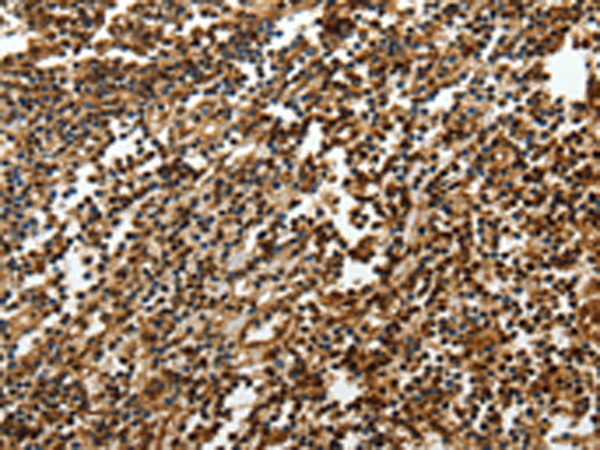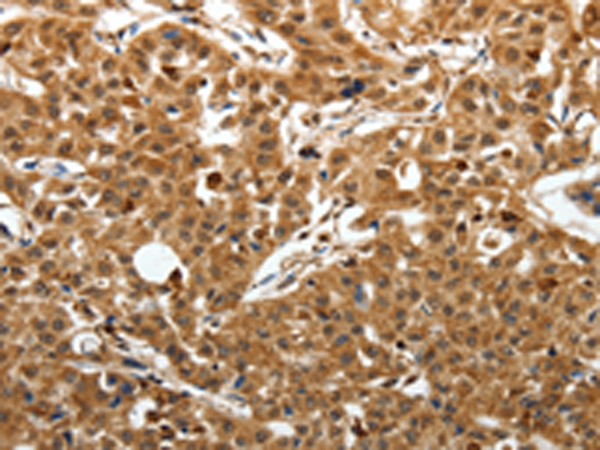


| WB | 咨询技术 | Human,Mouse,Rat |
| IF | 咨询技术 | Human,Mouse,Rat |
| IHC | 1/50-1/200 | Human,Mouse,Rat |
| ICC | 技术咨询 | Human,Mouse,Rat |
| FCM | 咨询技术 | Human,Mouse,Rat |
| Elisa | 1/2000-1/5000 | Human,Mouse,Rat |
| Aliases | ICA12; Sox-13 |
| WB Predicted band size | 69 kDa |
| Host/Isotype | Rabbit IgG |
| Antibody Type | Primary antibody |
| Storage | Store at 4°C short term. Aliquot and store at -20°C long term. Avoid freeze/thaw cycles. |
| Species Reactivity | Human, Mouse |
| Immunogen | Synthetic peptide of human SOX13 |
| Formulation | Purified antibody in PBS with 0.05% sodium azide and 50% glycerol. |
+ +
以下是关于SOX13抗体的3篇示例文献(内容为虚构,仅供格式参考):
1. **文献名称**:*SOX13 as an Autoantigen in Type 1 Diabetes: Antibody Detection and Functional Analysis*
**作者**:Smith A, et al.
**摘要**:研究通过ELISA和Western blot验证了SOX13抗体在1型糖尿病患者血清中的特异性,揭示了SOX13可能通过调控胰岛β细胞凋亡参与疾病进展。
2. **文献名称**:*SOX13 Expression in Pancreatic Cancer: A Novel Biomarker Identified by Immunohistochemistry*
**作者**:Zhang L, et al.
**摘要**:利用抗SOX13抗体进行免疫组化分析,发现SOX13在胰腺癌组织中高表达,并与患者预后不良相关,提示其作为治疗靶点的潜力。
3. **文献名称**:*SOX13 Regulates Neural Crest Development via Wnt Signaling Pathway*
**作者**:Garcia R, et al.
**摘要**:通过SOX13抗体阻断实验,证明SOX13在胚胎神经嵴细胞分化中通过调控Wnt通路活性发挥关键作用,为发育生物学研究提供新视角。
(注:以上文献为示例,实际文献需通过PubMed或学术数据库检索确认。)
The SOX13 antibody is a valuable tool in biomedical research, targeting the SOX13 protein encoded by the *SOX13* gene, a member of the SOX (SRY-related HMG-box) transcription factor family. SOX proteins are pivotal in regulating embryonic development, cell differentiation, and tissue homeostasis. Specifically, SOX13 belongs to the SOXD subgroup (alongside SOX5. SOX6. and SOX21) and is implicated in diverse developmental processes, including neural tube formation, pancreatic islet cell differentiation, and cardiac development. It also plays roles in immune regulation, particularly in T-cell function and thymocyte maturation.
In disease contexts, SOX13 has been linked to autoimmune disorders, cancers, and neurodevelopmental conditions. Notably, it is recognized as an autoantigen in type 1 diabetes and celiac disease, where anti-SOX13 autoantibodies serve as diagnostic markers. Dysregulated SOX13 expression has been observed in malignancies like colorectal and prostate cancers, suggesting potential roles in tumor progression or suppression depending on the cellular context.
SOX13 antibodies are widely used in techniques such as Western blotting, immunohistochemistry (IHC), immunofluorescence (IF), and ELISA to study protein expression, localization, and interactions. Researchers employ these antibodies to explore SOX13's regulatory mechanisms, including its interplay with Wnt/β-catenin signaling and chromatin remodeling complexes. Cross-reactivity with orthologs in model organisms (e.g., mice, rats) further enhances their utility in translational studies. Overall, SOX13 antibodies are critical for unraveling the protein's multifaceted roles in health and disease.
×